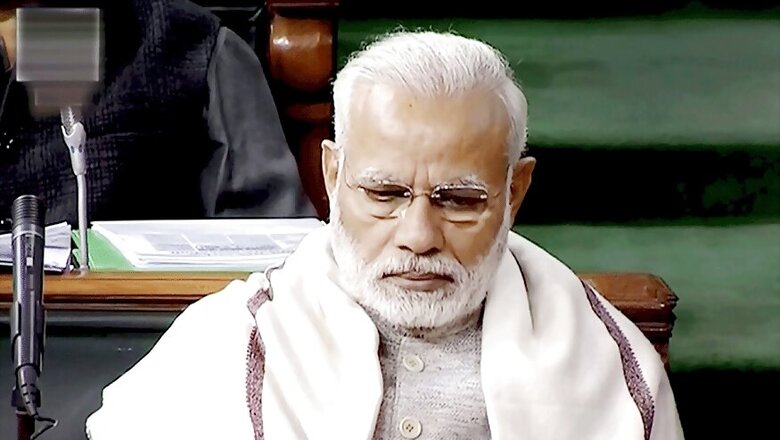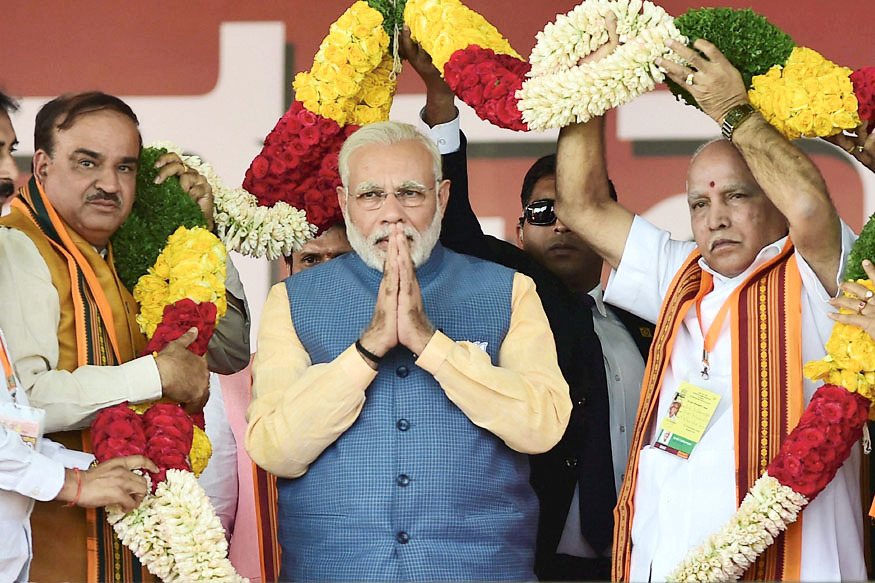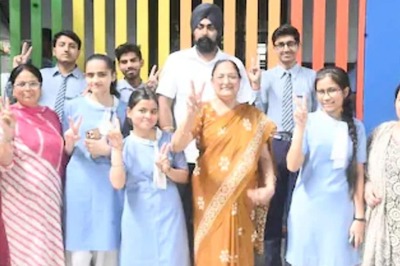
views
Bengaluru: Prime Minister Narendra Modi on Wednesday invoked the name of Basaveshwara or Basavanna, the great social reformer of 12th Century Karnataka, to counter Congress' claims that the first Prime Minister Jawaharlal Nehru is the father of democracy.
The most important Karnataka Assembly election weighing on his mind, Modi dedicated almost first half of the speech to talk about Karnataka. Perhaps, to connect with the Lingayats, the backbone of the BJP in Karnataka in recent years, the Prime Minister mentioned the name of their founder Basaveshwara or Basavanna calling him the real architect of democracy in India.
Modi said "the Congress repeats the lie that Nehru is the architect of democracy in India. But Basavanna had practised it in Karnataka 800 years ago through his Anubhava Mantapa".
Perhaps, Modi is not aware of the fact that Basavanna was admired by both Nehru and Mahatma Gandhi. During one of his visits to Karnataka, Mahatma Gandhi had famously said that Basavanna had taught the World everything 800 years ago what he was preaching in the 20th century. Congress stalwart Dr. Karan Singh is also an authority on the preaching of Basavanna and Vachanas.
A few hours after Modi finished his speech in the Parliament, the Karnataka Chief Minister Siddaramaiah hit back at him in a tweet asking him to follow the preaching of the great social reformer and mystic Basavanna.
PM @narendramodi ರವರೆIt was good of you to have remembered me in the Parliament today. I am glad you also remembered Basavanna.Basava said “those with wealth will build temples; what do I do a poor man?”Kannadigas will thank you sir if you could follow Basavanna’s teachings.— Siddaramaiah (@siddaramaiah) February 7, 2018
Quoting Basaveshwara, Siddaramaiah said “Ullavaru Shivalayava Maaduvaru, Naanena Maaduvenu Badavanayya” meaning (The rich will make temples for Siva. What shall I, a poor man, do?).
Vachana, meaning "speech", is a form of rhythmic writing in Kannada that dates back to 11th century.
According to scholars who have studied Basavanna's Vachanas, the wealthy prove their piety by financing temples. Their devotion is concretised in stone and gold. It's easy for a poor man, witnessing the splendour of a wealthy shrine, to imagine himself far behind on the road to heaven. What can he offer to compete with that? What temple can he build to offer proper worship?

Prime Minister Narendra Modi (centre) being presented a garland by Union Minister Ananth Kumar, State President B S Yeddyurappa and party workers on the completion of Parivartan Yatra rally in Bengaluru on Sunday. (PTI Photo)
Basava gives us the solution offered by saints everywhere: Make of yourself a temple.
My legs are pillars,
the body the shrine,
the head a cupola
of gold.
Listen, O lord of the meeting rivers,
things standing shall fall,
but the moving ever shall stay.
This is where all true meditation, prayer, communion occurs. The built temple is but a reflection of the temple of the self. And that true temple is available to all, rich and poor, equally. Basava carries it further, pointing out how far superior the inner temple is.
"Things standing," structures built of wood or stone, no matter how lovely or inspiring, are destined to fall. A temple of stone stands but does not move. It lacks the life necessary to continually adjust itself to the shifting forces of time and gravity and the flow of nature all around; it is already crumbling, argue scholars who have done research on Basavanna and his 12th century social reforms.
The Anubhava Mantapa, Narendra Modi referred to as India’s first democratic institution is considered one of the earliest forums for democratic debates. Founded by Basavanna, the forum was open to all irrespective of their gender, caste and social status. The great poets, thinkers, scholars, activists, reformers and feminists used to meet at Anubhava Mantapa to debate issues concerning the society of those times. Even the women and Dalits used to enjoy equal privileges there. Most of their debates are relevant even today.
Basavanna was born into an orthodox Brahmin family at Basavana Bagewadi in today's Bijapura district of Karnataka in 12th century. He was a highly respected minister at the court of King Bijjala of Kalyani Chalukyas who ruled most parts of north Karnataka. He revolted against the caste system in the Hinduism and founded a new religion called “Lingayats” to create a casteless society. His followers are known as Lingayats and they are the single largest community in Karnataka, today. Basava wrote profoundly meaningful poems called Vachanas in simple Kannada.
In Karnataka, politicians and commoners alike often quote his Vachanas to make a point.
The Lingayats are now demanding that they should be declared as a separate religion and they are not Hindus. Siddaramaiah has assured them that he will send a recommendation to the Centre and has already formed an expert committee to look into their demands.
The BJP is in a fix over their demand. Its CM face BS Yeddyurappa, a Lingayat, is maintaining total silence over the issue fearing serious backlash either from his own community or from the Hindus.
The RSS is opposing the division of Hindus and seems to be rattled by Lingayats demand.




















Comments
0 comment